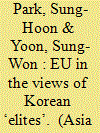|
|
|
Sort Order |
|
|
|
Items / Page
|
|
|
|
|
|
|
| Srl | Item |
| 1 |
ID:
137811


|
|
|
|
|
| Summary/Abstract |
The last two decades have seen most significant developments, which led to incremental upgrading of the Korea-EU bilateral relationship, including the adoption by the European Commission in 1993 of a strategy paper toward Korea, the presidency role played by Korea in the third Asia-Europe Meeting (ASEM) Summit in 2000 and the launch and entering into force of the bilateral free trade agreement (FTA) in 2007 and 2011, respectively, as well as the upgrading of the relationship to a strategic partnership in 2010. The imagery of the EU, however, does not seem to have improved substantially as these series of positive developments in bilateral relationship might suggest, as manifested in a few recent studies conducted on the EU perception in Asia and Korea. As an extension of the two previous interviews of Korean elites carried out in 2006 and 2009, a new round of elite interviews has been conducted to find out how the perception of the EU in the mindset of Korean elites has changed over the past years. The main findings of this paper are as follows. First, among a number of changes found in the comparative analysis of the three interviews, the bilateral FTA that appeared at the top as an immediate image of the EU in the two previous interviews lost its place substantially. Instead, the Eurozone crisis has become one of most influential EU images in the mid of Korean elites. Second, the global actorness of the EU has become substantively weakened in the eyes of the Korean elites over the past few years. As this was most strongly pronounced in the group of media representatives, the authors expect it to have lasting impacts on the images of the EU in the wider Korean public.
|
|
|
|
|
|
|
|
|
|
|
|
|
|
|
|
| 2 |
ID:
081380


|
|
|
|
|
| Publication |
2008.
|
| Summary/Abstract |
This paper seeks to understand the role of nationalism in China's policy towards the combat of emerging infectious diseases. By locating nationalism as a factor which facilitates or impedes global governance and international collaboration, this paper explores how nationalism influences China's political decision-making. Given her historical experience, China has in its national psyche an impulse never to become 'the sick man of the East' again. Today, China's willingness to co-operate with international bodies emanates out of reputational concerns rather than technical-medical considerations. This was clearly manifested in her handling of two epidemics in recent years: the Severe Acute Respiratory Syndrome (SARS) and HIV/AIDS episodes. This paper concludes that China's nationalism plays an inhibiting role in China's attempts to further incorporate herself into the architecture of global health governance in the long run.
|
|
|
|
|
|
|
|
|
|
|
|
|
|
|
|
| 3 |
ID:
158418


|
|
|
|
|
| Summary/Abstract |
Mongolia and the Republic of Korea are in the same “partnership basket” for NATO in the Asia-Pacific. The two countries have burgeoning relations with NATO, which represent a relatively new dimension of international engagement for the region. Through the lens of Strategic Narrative Theory, we attempt to grasp how the strategic narratives of the two countries resonate with NATO-originated messages sent to partners in the Asia-Pacific. Both countries are attempting to reach a certain level of stability in terms of their respective geo-strategic positions in the Asia-Pacific. In the context of its “Third Neighbor” approach, Mongolia is applying a hedging strategy with regard to NATO and other actors in the region, including China, Japan, Russia, and the US. Korea assigns primary significance to its bilateral relationships with bigger powers, most obviously and predominantly the US, while considering NATO a broadly useful if sometimes perfunctory additional partner on a number of other security issues.
|
|
|
|
|
|
|
|
|
|
|
|
|
|
|
|
|
|
|
|
|